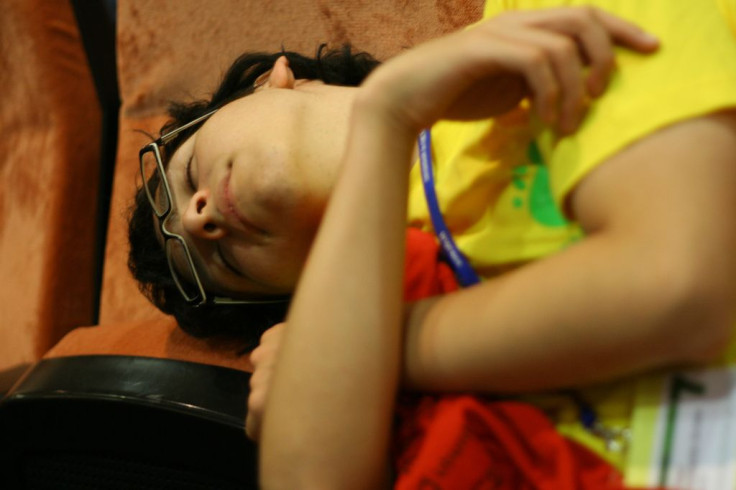Jet Lag And Other Biological Clock Disruptions Could Be Reset With Glucocorticoids

The bleary-eyed effects of jet lag may have met their match, according to a new study that found glucocorticoid tablets — a type of steroid hormone involved in immune system regulation — have positive effects on stabilizing some of the body’s biological clocks.
Left to their own devices, circadian rhythms tend to reset within several days. The red-eye flight from London to New York, however, won’t take nearly the toll on your body as the many years some people spend in rotating night-shift work, such as nurses and security guards. Long-term inconsistency can stress the body’s overall function. For scientists studying sleep cycles, tackling the immune system is just one point of entry.
“Problems adjusting to atypical work schedules are a major issue for society,” said Dr. Diane B. Boivin, Director of the Centre for Study and Treatment of Circadian Rhythms, in a statement. “Our previous studies clearly show that desynchronized circadian clocks disrupt the sleep, performance, and cardiac parameters of night-shift workers.”
Unfortunately, up until recently, the problem of how to combat desynchronized circadian clocks had been left open-ended. Boivin and her colleagues wanted to understand at a fundamental level how the body responds to unstable sleep schedules. After exposing 16 subjects to temporal isolation chambers, disorienting their body clocks, they discovered the normal glucocorticoids that get released interact with white blood cells to promote immune responses. When the subjects received the hormones in tablet form, their clocks seemed to return to normal.
The work is admittedly early, Boivin says. “At this stage, we are not recommending the use of glucocorticoids to adjust the rhythms of night-shift workers, as there could be medical risks.” But the team is confident glucocorticoids could lead them in the right direction for further studies into sleep loss. “These results lead us to believe that we may one day be able to use a combined therapy that targets the central clock,” such as inverting work schedules or administering controlled light therapy, “with a pharmacological treatment that targets the peripheral clocks to ensure that all clocks are adjusted.”
Rotating night-shift work is some of the most silently taxing work around. It can seriously up your risk for obesity and heart attack, and it can even age your brain by a decade. A recent study found the startling fact that five years of rotating night-shift work can increase a person’s risk for early death by 11 percent. Across all the research, the moral is the same: The body isn’t equipped to handle rollercoaster sleep.
Not that the U.S. is particularly worried. The Centers for Disease Control and Prevention estimate that 43.7 percent of Americans between the ages of 18 and 25 still fell asleep unintentionally during the day at least once in the month prior to getting surveyed. That rate dips to a low of 34 percent for 35- to 45-year-olds before climbing back up to 44.6 percent in seniors over 65. The CDC has formally labeled sleep deprivation in U.S. a public health epidemic.
What troubles researchers like Boivin and those at the CDC is overall lack of sleep combined with irregular schedules. Ideally, people would go to sleep at the same time each night, sleep soundly for seven to eight hours, and awake refreshed. But given the new research, it’s an ideal that is seldom lived up to.
Source: Cuesta M, Cermakian N, Boivin D. Glucocorticoids entrain molecular clock components in human peripheral cells. The FASEB Journal. 2015.
Published by Medicaldaily.com



























